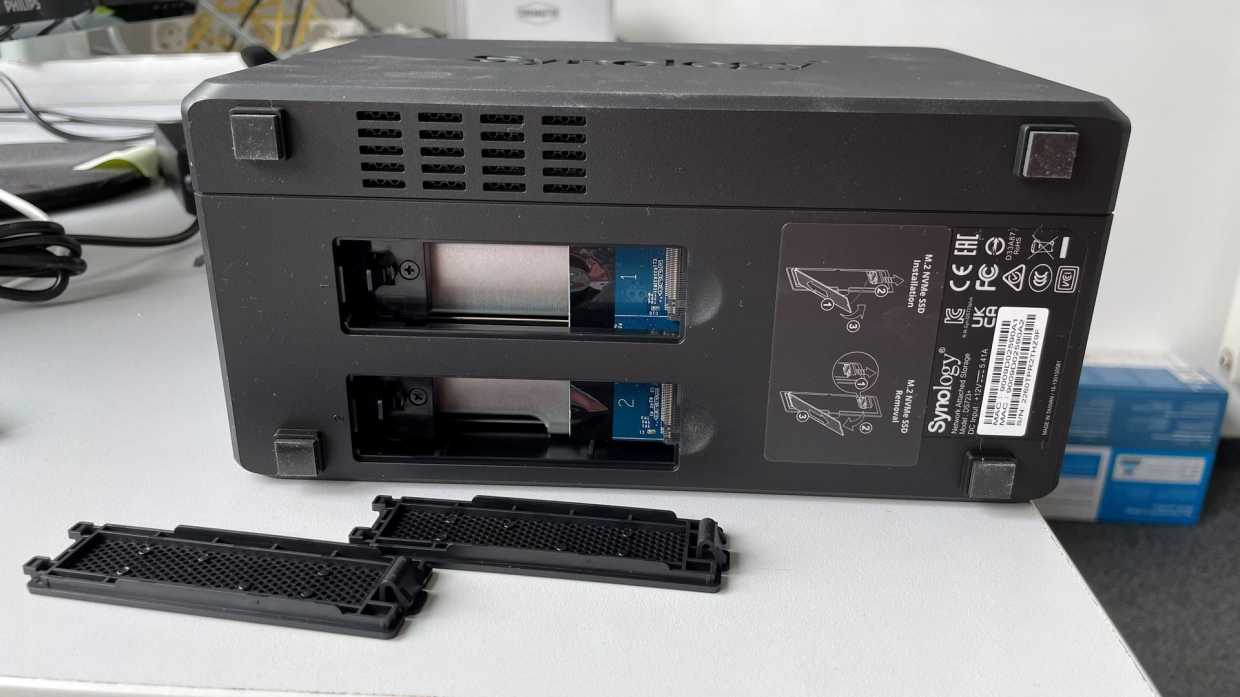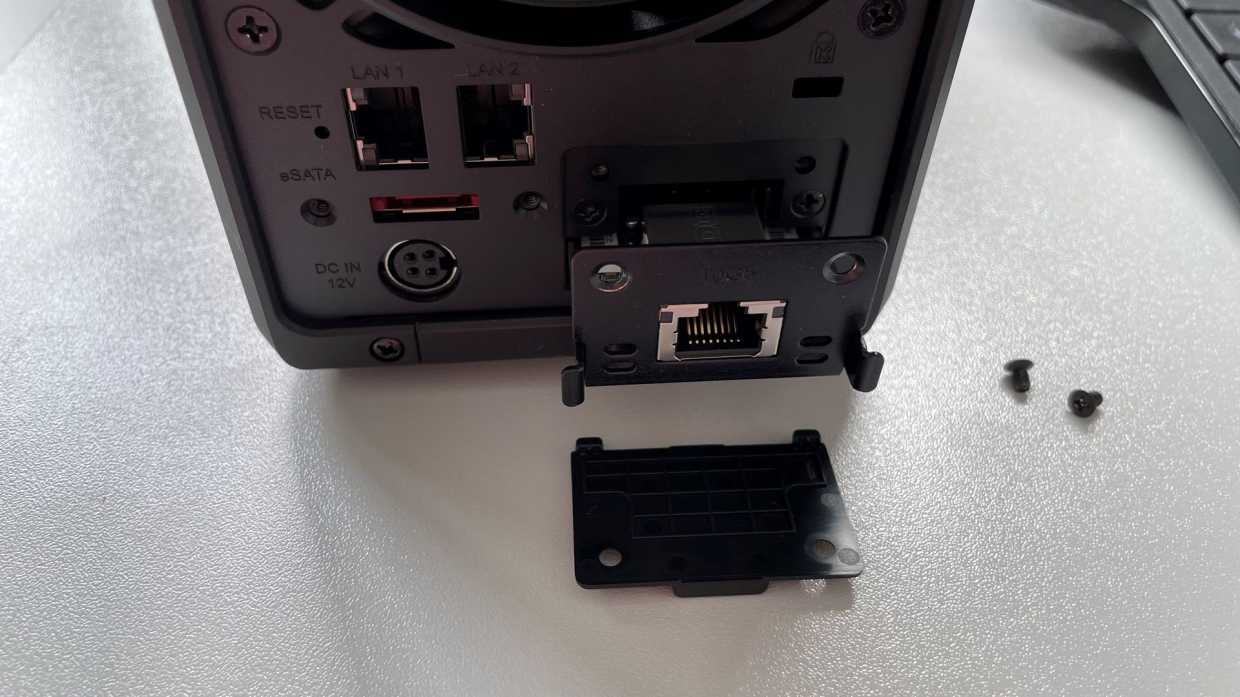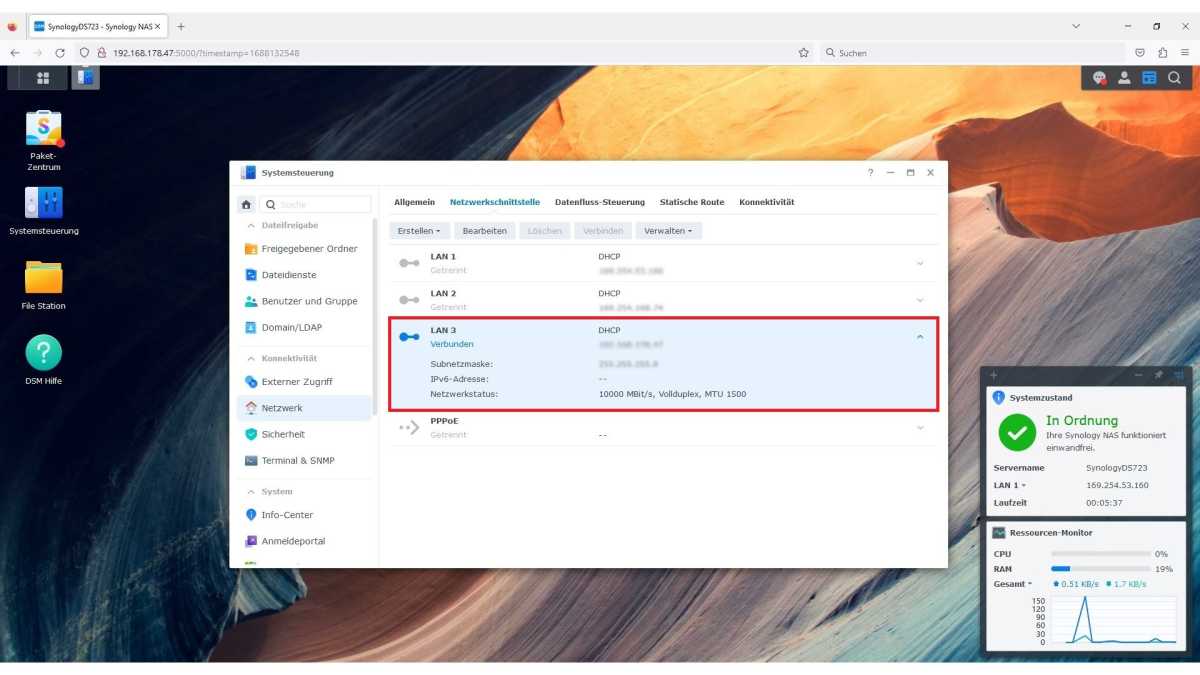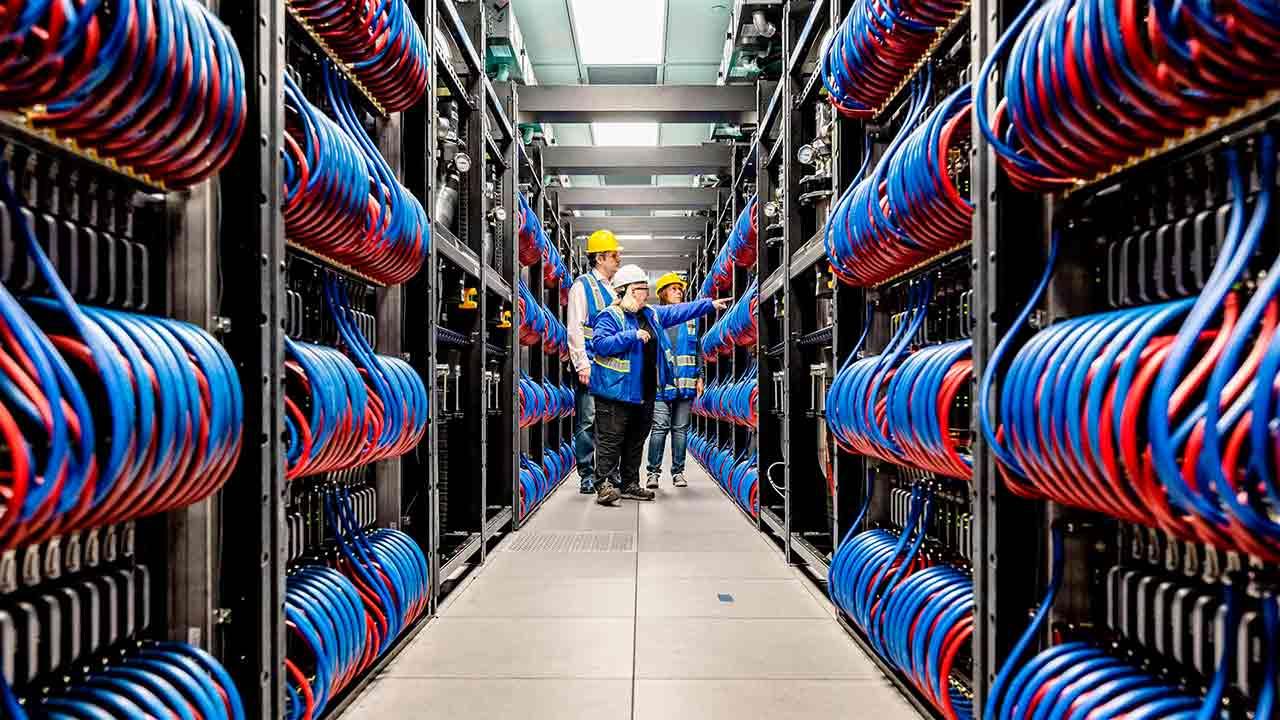Expert’s Note
The Pluses
- Powerful NAS
- The compact Moinstruction
- PCIe slot for 10GbE card
- 2 bays for NVMe SSD
Our verdict
Even in its basic configuration, the Synology Diskstation DS723+ network storage is designed for performance. The NAS system fulfills the promise of high performance in 1GbE mode, thanks in particular to the powerful AMD processor. That’s not all, because the strength of the 2-bay device lies in its future-proofing. Several expansion options ensure this. They start with RAM, go through NVMe SSDs and extend to the multi-gigabit local network.
This latest upgrade idea is particularly innovative, as it allows for a seamless transition from 1GbE to 10GbE. It’s a commendable concept, although it does assume you’re willing to make a relatively large investment for a two-bay NAS.
Best Prices: Synology DiskStation DS723+
The Synology Diskstation DS723+ is a two-bay empty NAS enclosure designed for use by small businesses or freelancers. In addition to high performance out of the box, longevity is also important. The test examines how well the NAS system delivers on both promises.
Equipment: with AMD Ryzen
With the Ryzen R1600 (dual core, 2.6 GHz clock, 3.6 GHz Boost), the NAS manufacturer is relying on an AMD processor for the first time in this series and is turning away from Intel processors here. In the basic configuration, two GB of RAM (DDR4 ECC SODIMM) are added to the CPU, a memory equipment that reaches its limits as soon as the possibilities of the NAS system are exhausted. However, the RAM can be easily expanded. The Synology is designed for a maximum of 32 GB in total via two bays.
The two 1GbE LAN ports are located on the back of the case. In addition, there is an eSATA port, which has become rare. In this case, it is intended for a NAS expansion box. The only USB 3.2 Gen1 interface is located on the front of the NAS.

Foundry
The two M.2 slots on the underside of the housing show that the Diskstation DS723+ wants to meet high demands. NVMe SSDs of size 2280 can be inserted here, which can be used both for fast caching and for additional storage capacity. In addition, on the back of the housing there is a PCIe slot behind a screwed cover, which allows the NAS system to be upgraded to a multi-gigabit level via an expansion card.
The Synology E10G22-T1-Mini network card designed for this purpose costs around 180 dollars and provides up to 10GbE, but also the intermediate levels of 2.5 and 5GbE.

IDG Foundry
Both drive bays of the Synology Diskstation DS723+ can be locked. Two plastic keys are included with the device. The hard drive carriers are made of the same material. 3.5-inch hard drives can be attached without tools using side clips. For 2.5-inch hard drives (HDD or SSD), suitable screws are included to give the smaller drives the necessary hold.
Synology is now focusing on its own drives. If you want to compare the data carriers with the compatibility list of the DS723+ on the website, you have to switch from “Synology” to “Third-party manufacturers” in a drop-down menu above the list. Currently, the maximum capacity is 36 TB, 18 TB per drive.
Easy commissioning
As usual with the NAS manufacturer, the Synology Diskstation DS723+ is easy to put into operation. After connecting to your network, you search for it either via the browser and http://find.synology.com or via the Synology Assistant help tool, which you can download free of charge from the manufacturer’s support website on the client PC.
In both cases, you arrive at the web wizard for the Diskmanager (DSM) firmware installation. With version 7.2, the Synology Diskstation DS723+ uses the current version at the time of testing. In the first steps of the installation, you can individually choose some settings, between Btrfs and Ext4 as the file system, and you also have several options for the raid mode. We stick to the SHR (Synology Hybrid Raid) recommended by the manufacturer, which looks like a Raid 1.
Speed: high data rates
The fact that the Synology Diskstation DS723+ empty NAS enclosure is aimed at the experienced NAS user is evident, for example, in the fact that you configure directories such as “Home” or “Public” yourself. On entry-level devices, these are usually created automatically. However, since the DSM user interface is very clear, this is not a particular obstacle even for a less experienced NAS user. This is especially true since it is possible to get an overview of the most important DSM settings during a “quick tour”.
Already during benchmark runs with the Nastester tool, the Synology Diskstation DS723+ shows a high performance on the 1GbE LAN connection. On average, the sequential data rates fluctuate between 117 and 118 MB/s for both writing and reading, a very good result.

IDG Foundry
If we use the multi-gigabit card, the 10GbE port is reported as “LAN 3”. This is where the working memory proves to be a hindrance. As soon as it is full, the data rates decrease, especially for large files. The NAS system cannot fully exploit the bandwidth of the local network. Overall, the network storage achieves the best performance with the 100 MB file of the Benchmark tool. Here it delivers 553 MB/s for writing and 642 MB/s for reading. For comparison, the throughput of the 8 GB file drops to 175 MB/s for writing and 166 MB for reading.
The practical tests in Gigabit mode on a LAN port are absolutely convincing: The DS723+ writes and reads the UHD film at just over 109 MB/s. During our 2 GB backup with 4195 files, it also achieves a high performance with almost 40 MB/s, the best value so far is 43 MB/s. In addition, the NAS system is resilient. This is because it also achieves a peak value when writing the backup and the UHD film simultaneously with almost 79 MB/s.
As in the benchmark test, the NAS system cannot fully exploit the bandwidth on the 10GbE LAN port: It writes the UHD movie at almost 160 MB/s and reads it at over 161 MB/s. When writing backups, it reaches 66 MB/s. If it performs both tasks at the same time, it reaches 123 MB/s. Overall, it is not possible for you to upgrade from a hardware upgrade to multi-gigabit, absolutely in the case of RAM, but also for NVMe SSDs.
Environment & health: silent but energy-intensive
The Synology Diskstation DS723+ network storage runs very quietly during the test. The “quiet mode” is set at the factory in the DSM. This setting has the effect that only the magnetic disks are slightly audible. The power consumption of the Synology Diskstation DS723+ shows that high power increases the energy requirements.
Under load, the device consumes a good 31 watts, in idle mode, the power consumption drops to 21 watts. Consumption can be reduced by the sleep mode for the drives. When this is activated, consumption drops to 10.2 watts, a value that is in the upper third of the test range. In 10GbE mode, you have to count on about 4 to 5 watts more.
Price and availability
Find the Diskstation DS723+ on Amazon, Boulanger, Cybertek, Fnac or LDLC for example. It is less than $600.
Synology Diskstation DS723+: Test Results and Technical Specifications
| Test results | |
| Tested firmware version | DSM 7.2-64570 update 1 |
| UHD Movie Write / UHD Movie Read (MB/s) | 1GbE: 109.1 / 109.2; 10GbE: 159.8 / 161.4 |
| Backup Write (MB/s) | 1 GbE: 39.4; 10 GbE: 66.6 |
| UHD Movie Copy and Backup Write (Simultaneous) (MB/s) | 1 GbE: 78.7; 10 GbE: 123.5 |
| NAS Performance Tester: 100MB Write/Read (MB/s) | 1GbE: 116.8 / 117.9; 10GbE: 553.0 / 642.0 |
| NAS Performance Tester: 400MB Write/Read (MB/s) | 1GbE: 117.7 / 118.1; 10GbE: 226.6 / 770.7 |
| NAS Performance Tester: 8000MB Write/Read (MB/s) | 1GbE: 117.2 / 115.8; 10GbE: 174.9 / 166.4 |
| Installation/Control panel/Buttons | simple/only LEDs/no |
| Hard drive change / disk change in operation | possible without tool/yes |
| Status messages by | Mail/SMS/Audio signal |
| Power consumption: idle/sleep mode/charging/off | 21.4 / 10.2 / 31.4 / 0.4 watts |
| Temperature: idle/charging | 26 / 27 degrees Celsius |
| Operating noise: idle/load | very quiet/very quiet |
| Dimensions (L x W x H)/Weight (unequipped) | 106 x 222 x 161 mm / 1.5 kg |
| Synology Diskstation DS723+: Technical data | |
| Number of hard drive bays/integrated drives | 2 / 0 |
| Connections: USB 3.2 Gen /eSATA / network / anti-theft | 1 / 1 / 2 / yes |
| File system(s) | Btrfs, EXT4 |
| RAM: available/upgradable | 2048 MB DDR4 ECC SODIMM/ yes (max. 32 GB) |
| Processor (speed) | AMD Ryzen R1600 dual-core (2.6 GHz (Boost 3.1 GHz)) |
| Jumbo Frame Support | Yes |
| Hardware encryption | yes (AES-NI) |
| Scope of delivery | LAN cable, 10x screws (2.5 inch), 2x power cables, power adapter, quick installation guide; 2x keys |
| Programs provided | Synology Assistant (download) |
| Server Services: FTP/Print/Web Server/Webaccess | yes / yes / yes / yes |
| Media server by: DLNA/UPnP-AV/iTunes | yes / yes / yes |
| Raid modes: 0 / 1 / 5 / 1+5 / matrix / JBOD | yes / yes / no / no / no / yes |
| IPV6 compatible | Yes |
| Ability to install 2.5 inch HDD/SSD | Yes |
| Supplements | 2x NVMe bays, 1x PCIe 3.0 slot |
| Official French site | https://www.synology.com/fr-fr/ |
| Manufacturer’s Warranty | 36 months |
Adaptation of the original test published on our sister site PCWelt
Table of Contents







